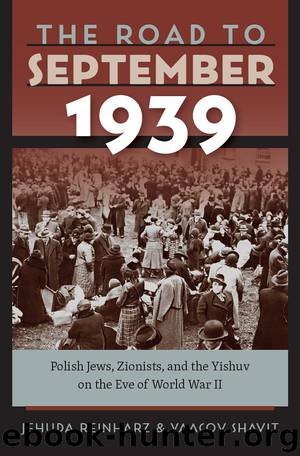The Road to September 1939 by Jehuda Reinharz

Author:Jehuda Reinharz
Language: eng
Format: epub
Publisher: Brandeis University Press
At the beginning of July the authorities published the census that had been held in Germany and Austria on May 17. Of the approximately 560,000 Jews who lived in Germany in 1933, around 215,000 Jews had emigrated, around 30,000 were being held in prisons and detention camps, around 20,000 had committed suicide, and 8,000 had been murdered. Out of the 300,000 Jews of Austria, 145,000 were left in the country: 130,000 had emigrated, around 10,000 were imprisoned, a similar number had committed suicide, and 5,000 had been murdered.192
News of abuse and murder in the detention camps and of pogroms in Austria and Czechoslovakia were published regularly. On July 13, Britain’s Secretary of State for the Colonies announced that in October the immigration would be stopped due to the scale of the illegal immigration. In response, a Jewish general strike was announced in Palestine from 2 p.m. until midnight. The National Council released a public statement calling on Britain to stop abusing the Jewish people. On July 20 the Union of Religious Organizations protested to the Tel Aviv mayor about “the shameful phenomenon seen on the Tel Aviv beach, as the bounds of modesty are breached by men and women bathing together, with no partition separating them, against all the rules of modesty. This phenomenon is shocking to the Jewish public in general and to religious Jews in particular.”
The bloody events in Palestine continued. On July 23, Avraham Goldfaden’s play Mirale Efros opened with Hannah Rovina in the leading role. At the end of July, the Swiss government forbade Jewish refugees from entering the country’s borders. At the beginning of July, preparations were completed for the Twenty-First Zionist Congress in Geneva.
Kanari (2003), 447.
Cohen, M. J. (1978), 66–87.
The palace had already hosted several international conferences, such as after the second Balkan war in 1912, and regarding the future of India in 1930–1931. See Scott (2010).
Ibid., 114–115.
Ben-Gurion (1971–1987), vol. 5, 110: letter from February 18, 1938.
Ibid., 114–115.
Ibid., 360–364: letter from February 18, 1938.
Gilbert, M. (2006), 121–134.
Sharett (1968–1979), vol. 3, 262.
Ibid., 308.
Ruppin (1968), 304–305.
Ibid., 306.
Cohen, M. J. (1978), 73.
In Yahil (1990), 115.
On March 7, 1938, Jabotinsky wrote: “We anticipate great changes in the world, and particularly in the Jewish world; I do not know what these changes will be, but I feel like they will be constructive, positive and uniting” (Jabotinsky, Igrot, 13, 2014, 4). Throughout 1938 Jabotinsky never wrote about the Munich Pact or the takeover of Czechoslovakia.
Ben-Gurion (1971–1987), vol. 5, 258–265: letter from September 20, 1938.
Sharett (1968–1979), vol. 3, 311.
Ben-Gurion (1971–1987), vol. 5, 276: diary entry from 1938.
Ibid., 290: letter to the Zionist Executive from October 3, 1938. See also ibid., 281–283: letter from October 1, 1938.
Overy and Wheatcroft (2009).
Ben-Gurion (1971–1987), vol. 5, 281: letter from October 1, 1938. Teveth (1987), 251–252.
The 1938 events that led to the Munich Agreement are described in detail in Faber (2009).
Weizmann (1979–1984), vol. 18, 465–466: letter from October 3, 1938.
Ben-Gurion (1971–1987), vol. 5, 272: letter to Ussishkin from October 24, 1938.
Braginsky (1965), 119–120.
Shapira, A. (2008), II, 570.
Download
This site does not store any files on its server. We only index and link to content provided by other sites. Please contact the content providers to delete copyright contents if any and email us, we'll remove relevant links or contents immediately.
The Vikings: Conquering England, France, and Ireland by Wernick Robert(79863)
Ali Pasha, Lion of Ioannina by Eugenia Russell & Eugenia Russell(40128)
The Conquerors (The Winning of America Series Book 3) by Eckert Allan W(37102)
The Vikings: Discoverers of a New World by Wernick Robert(36906)
Cecilia; Or, Memoirs of an Heiress — Volume 1 by Fanny Burney(32408)
Cecilia; Or, Memoirs of an Heiress — Volume 3 by Fanny Burney(31812)
Cecilia; Or, Memoirs of an Heiress — Volume 2 by Fanny Burney(31785)
Empire of the Sikhs by Patwant Singh(22956)
The Secret History by Donna Tartt(18802)
Hans Sturm: A Soldier's Odyssey on the Eastern Front by Gordon Williamson(18453)
Cat's cradle by Kurt Vonnegut(15145)
Pimp by Iceberg Slim(14305)
Sapiens: A Brief History of Humankind by Yuval Noah Harari(14204)
Talking to Strangers by Malcolm Gladwell(13180)
Norse Mythology by Gaiman Neil(13166)
Leonardo da Vinci by Walter Isaacson(13139)
4 3 2 1: A Novel by Paul Auster(12260)
Underground: A Human History of the Worlds Beneath Our Feet by Will Hunt(11994)
The Radium Girls by Kate Moore(11896)
